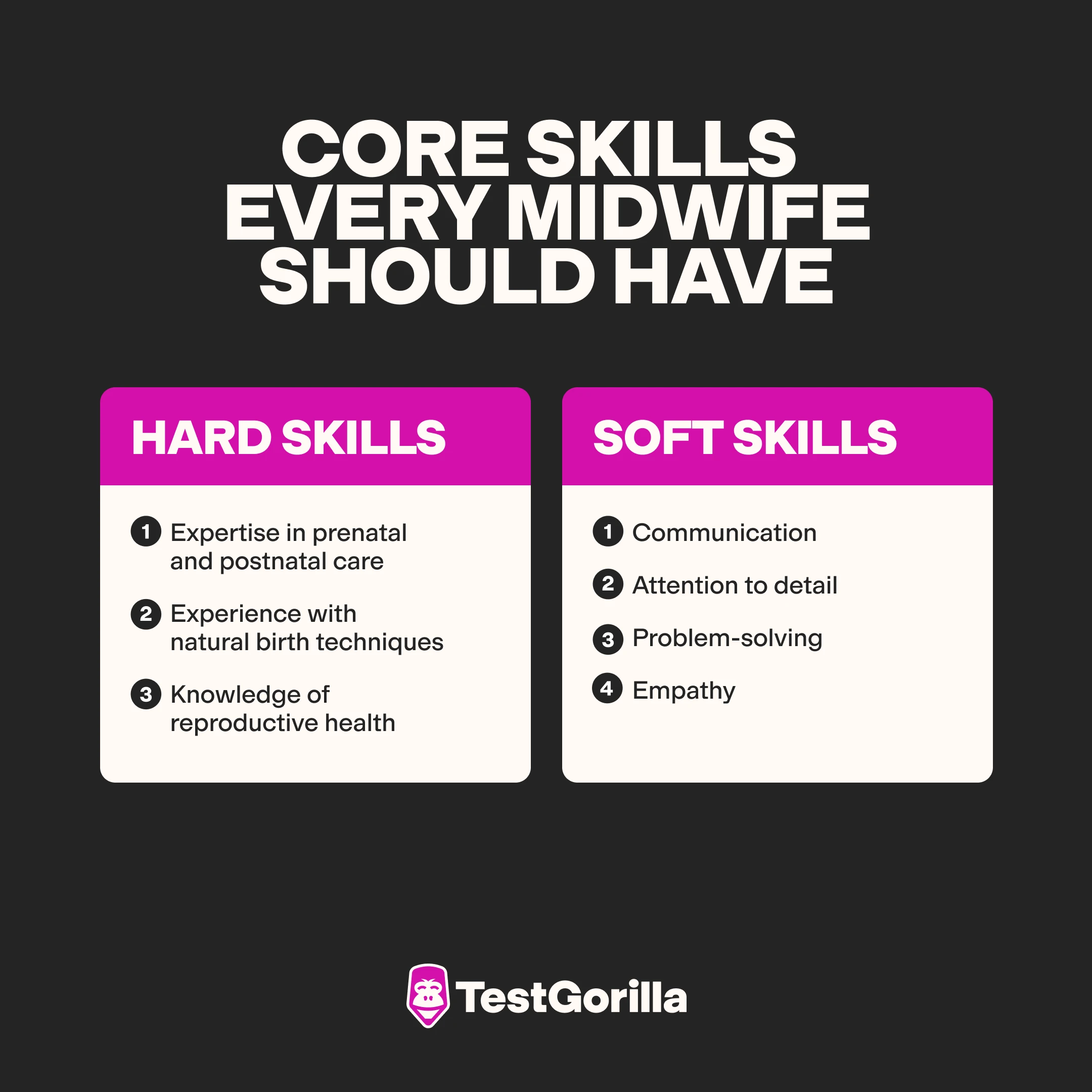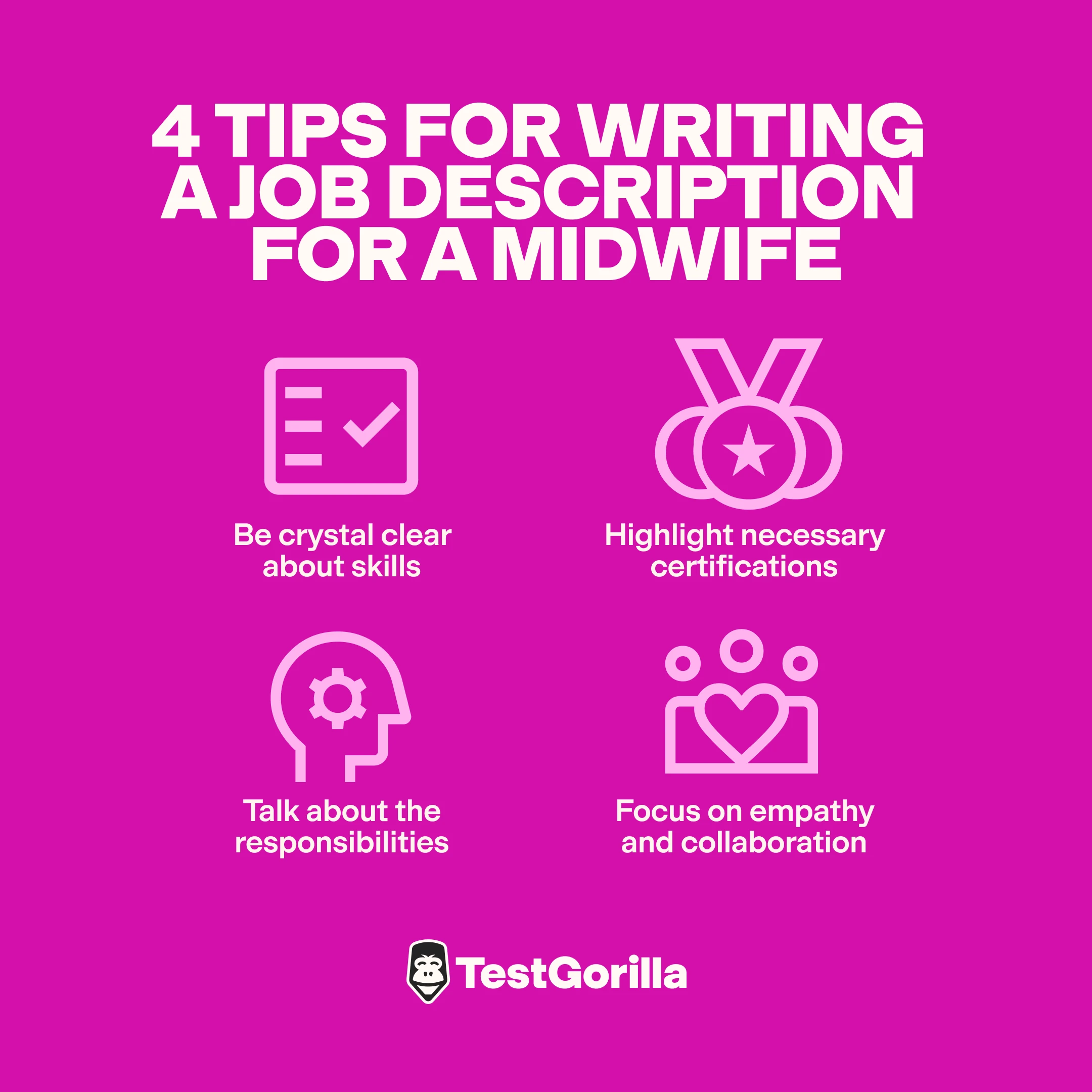Midwives are trained professionals who support women through pregnancy, labor, and postpartum. They manage a busy workload to ensure each woman in their care has the top-quality, personalized care they need to deliver their baby safely.
A great midwife can make a huge difference in the birthing experience, offering support and expertise in natural childbirth. But making a bad hire can lead to miscommunication, unmet expectations, and serious risks if complications arise during birth that the midwife isn’t qualified to handle.
No need to worry, though – we've got you covered. Our guide will show you how to find and hire a great midwife quickly and without bias.
Table of contents
- What is a midwife?
- 7 skills to look for when hiring a midwife
- How to test your future midwife’s skills
- Where to find midwife candidates
- Tips for writing a midwife job description
- Top interview questions for a midwife
- 2 mistakes to avoid when hiring midwives
- FAQ
- Connect with caring midwives using TestGorilla
What is a midwife?
Midwives are healthcare providers who focus on pregnancy, childbirth, newborn care, and postpartum health. They’re known for their holistic and natural approach to birth, making them a popular choice for those wanting a non-medicated birth or home birth.
They aren’t typically doctors, but they often work with obstetricians and gynecologists (Ob/Gyns) in hospitals to ensure you get all the care you need. They’re a great option for low-risk pregnancies or when there are only mild complications.
Midwives offer a range of services depending on their training and certifications. Certified midwives and certified nurse midwives can provide:
Prenatal checkups and routine pregnancy monitoring
Ultrasounds and prenatal blood tests
Support during birth and newborn care
Postpartum care and advice
Education on nutrition, breastfeeding, and fertility
Birth control and family planning
Pap tests and breast exams
Screening for sexually transmitted infections (STIs) and other vaginal issues
7 skills to look for when hiring a midwife
Here are seven key skills to look for in top-notch midwife candidates.
Hard skills and knowledge
Here are the essential skills a midwife needs to succeed.
Expertise in prenatal and postnatal care: A good midwife knows how to take care of the patient and their baby before and after birth. They handle everything from routine checkups and tracking the baby’s growth to offering support after the baby is born, making sure both parent and baby are healthy.
Experience with natural birth techniques: Midwives often support natural childbirth, so look for experience with techniques like breathing exercises, water births, and other non-medicated pain management methods.
Knowledge of reproductive health: They should be well-versed in areas like birth control counseling, Pap tests, and screenings for STIs and other vaginal infections, providing holistic care throughout a person’s reproductive life.
Soft Skills
Don’t overlook these important soft skills.
Communication: Since midwives work closely with mothers and their families, clear and compassionate communication is key. They need to explain medical information in an understandable way and provide emotional support.
Attention to detail: Midwives must carefully monitor mother and baby for any signs of complications, making sure nothing is overlooked. This meticulousness helps keep their patients healthy and safe.
Problem-solving: Childbirth can be unpredictable. A good midwife needs to quickly recognize any issues and know how to address them, whether it’s a minor hiccup or an emergency situation.
Empathy: Midwives spend a lot of time with mothers and families, so understanding and connecting with their feelings is key. Being empathetic helps midwives offer compassionate care, build trust, and support their clients.
The best insights on HR and recruitment, delivered to your inbox.
Biweekly updates. No spam. Unsubscribe any time.
How to test your future midwife’s skills
Before including a midwife in a birthing journey, it’s crucial to quickly and accurately test their skills to see if they’re the right person for the job.
TestGorilla offers pre-employment tests that let you quickly see how a midwife measures up, identify any gaps, and figure out what to focus on during interviews. You can mix and match up to five tests and create a go-to test pack that makes your hiring process smooth and structured.
You can also create your own custom questions to test midwife candidates’ hard skills, expertise, and techniques.
Here’s a rundown of the tests we recommend to streamline your search for the perfect midwife:
Our Communication Skills test assesses how well candidates can understand and interpret written information, use active listening skills, and sum up messages and next steps. These are key skills for midwives who need to communicate with patients on a variety of issues related to prenatal care and the birth process.
The Critical Thinking test is a great tool because it checks whether your candidates can analyze situations and make sound judgments based on the information they have.
The Problem-Solving test test checks if candidates can quickly identify and address issues. These skills are crucial for managing problems that can pop up during pregnancy, labor, and postpartum care.
It’s also important to get a sense of your midwife candidates’ empathy, leadership, and collaborative skills. Include personality tests like the Enneagram, DISC, and 16 Personalities tests to key in on the right personality fit for your role.
Where to find midwife candidates
You have a few options when it comes to finding new midwife candidates. Each has its pros and cons, which you’ll need to weigh when deciding among them.
Online job boards (Indeed, Monster, Glassdoor)
Traditional job boards can be a source of midwife candidates, but bear the following in mind:
Pros:
Wide reach and visibility
Easy to post and manage job listings
Access to a large pool of candidates
Cons:
High volume of applicants can be overwhelming
May attract unqualified or unspecialized candidates
Can be difficult to gauge a candidate’s passion for midwifery
Professional associations (American College of Nurse-Midwives, Midwives Alliance of North America)
If you’re looking at specific accredited institutions for candidates, you’ll want to consider the below:
Pros:
Access to highly qualified and certified candidates
Networking opportunities through events and forums
Targeted audience specific to midwifery
Cons:
Membership fees may apply
Smaller candidate pool compared to general job boards
Longer process to connect with candidates
Local hospitals and birth centers
Contacting medical facilities or institutions can be a helpful strategy, but make sure to consider these points:
Pros:
Direct access to experienced midwives
Opportunity to observe candidates in their working environment
Relationships within the local healthcare community
Cons:
Limited to local candidates
Time-consuming to visit multiple locations
May not have potential candidates looking for new opportunities
Tips for writing a midwife job description
Here are four tips for writing great job descriptions for midwives:
1. Be crystal clear about skills
Spell out the exact skills you’re looking for, like expertise in prenatal and postnatal care, experience with natural birth techniques, and knowledge of reproductive health. This helps midwife candidates know if they’re a good fit based on their qualifications.
2. Highlight necessary certifications
Don’t just write a laundry list of skills. Mention the certifications and training they should have, like being a Certified Nurse Midwife (CNM) or a Certified Professional Midwife (CPM). This specificity helps attract candidates who meet your essential requirements.
3. Talk about the responsibilities
Explain what kind of care they’ll be providing and what their daily tasks will be. This gives potential candidates a clear picture of what they’ll be doing and what’s expected of them, which can motivate the right candidates to apply.
4. Focus on empathy and collaboration
Since midwives work closely with mothers and healthcare teams, mention the importance of empathy and strong communication skills. Highlighting the need for these soft skills makes sure you attract midwives who can offer compassionate care and work well with others.
Check out these skills-based job description templates for more inspiration.
The takeaway: keep it straightforward and clear, and you'll attract midwives who can provide exceptional care.
Top interview questions for a midwife
Here are some key interview questions to ask your midwife candidates:
"Can you describe your approach to prenatal and postnatal care?" This explores how the candidate manages care before and after birth, highlighting their expertise and how they make sure both patient and baby are healthy.
"Tell me about a time you faced a challenging birth situation. What did you do?" This gets at how they handle tough situations and resolve issues, showing their ability to remain calm and professional during emergencies.
"How do you communicate complex medical information to expectant parents and their families?" This checks their communication skills, ensuring they can explain important details in an understandable and compassionate way.
"Can you provide an example of how you've supported a mother or parent who wanted a natural birth?" This helps you understand their experience with natural birth techniques and how they support the mother's birth plan.
2 mistakes to avoid when hiring midwives
Here are two pitfalls to watch out for when hiring a midwife.
1. Rushing the hiring process
Childbirth prep and care are too important to rush. Take the time to thoroughly interview candidates, conduct background checks, and evaluate their skills and experience. Not doing this increases the risk of choosing someone who may not be the best fit, compromising the quality of care for mothers and babies.
2. Overlooking compatibility with the existing healthcare team
It's essential that the midwife can work well with your existing healthcare team, including doctors, nurses, and other staff. Ignoring this can lead to communication breakdowns and a less cohesive care environment.
Make sure the candidate can collaborate well and share the same commitment to patient care as the rest of your team.
FAQ
Here are some common questions about hiring midwives.
How do I verify a midwife’s credentials?
You can verify credentials through professional organizations like the American College of Nurse-Midwives (ACNM) or state licensing boards. Also, ask for and check their certifications, licenses, and references.
Can a midwife attend a hospital birth, or do they only assist with home births?
Many midwives can attend both hospital and home births. Certified Nurse Midwives (CNMs) often have hospital privileges, while Certified Professional Midwives (CPMs) typically specialize in home and birth center deliveries.
Connect with caring midwives using TestGorilla
Midwives play a crucial role in pregnancy, childbirth, and postpartum care, so hiring the right one is essential. You need someone with hands-on experience, strong communication skills, and the ability to provide compassionate, personalized care.
But don’t just rely on resumes to find the perfect fit. TestGorilla can help with our comprehensive library of talent assessments, making it easy to spot top candidates who have the right skills and demeanor for your needs.
Ready to improve your hiring process? Sign up for a free TestGorilla account or book a demo today!
You've scrolled this far
Why not try TestGorilla for free, and see what happens when you put skills first.
















